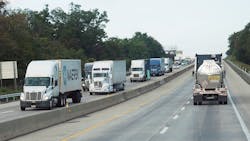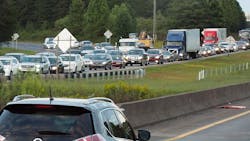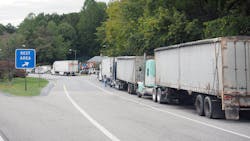Rigid, continuous on/off-duty time is source of HOS problems, drivers say
Don't add to the overall time frame allowed for driving, many commercial truck drivers say, but allow that time to be paused when drivers are delayed, rather than requiring those 14 hours to keep running down and forcing a race against the clock. Or allow the off-duty/sleeper berth time the HOS rules call for to be split up to allow drivers to rest when they need to and break up the on-duty clock.
We thought we'd heard a lot about what truck drivers and fleets say should be changed concerning the Federal Motor Carrier Safety Administration's (FMCSA) HOS regulations. But after our last article seeking input and now that there's been nearly three weeks of electronic logging device (ELD) full enforcement, hundreds more comments flooded in.
This is clearly an issue that many drivers feel very strongly about.
So much so, actually, that it's hard to sum up all the thoughtful responses and suggestions that they gave. But page after page, poring through their comments, there are common themes that a large majority of drivers keep repeating. And it wasn't only drivers but others like fleet dispatchers, owners and third-party logistics (3PLs) providers who had real suggestions for what would solve the problems drivers say the HOS rules are causing.
Overall, the complaints aren't focused on ELDs themselves but on the HOS rules the devices enforce. In conversations with Fleet Owner, several ELD providers acknowledged hearing this exact same feedback from drivers and customers using their products. One ELD maker even noted it's exploring adding changes to its devices ahead of time, such as a way to pause on-duty time, in response to what the company has been hearing.
But it's up to FMCSA to make any changes to the regulations or not. The latest notice from the agency was that ELD violations will now be recorded in carriers' Compliance, Safety, Accountability (CSA) scores and have had severity weights set in the Safety Measurement System.
Here's what Fleet Owner has heard.
Fix the rigidity and inflexibility.
"The [HOS] rules themselves aren't terrible; it's the lack of flexibility that is the worst," the president of one trucking company said.
A company that provides regulatory services for owner-operators and small trucking companies noted, "A few of the comments we hear: 'Need flexibility with the on-duty clock.' 'Too much time is wasted waiting to load or unload.' 'Taking a nap and have to move the truck to break the 10-hour off-duty time.' 'Getting loaded/ unloaded late and then have to move off the property to find a parking spot with little or no on-duty time left.'"
"It's not easy being expected to drive the same way every day," a driver argued. "Situations change. We as professionals are not robots! So many things factor into a 14-hour day."
Many comments focused on detention time — delays getting unloaded or loaded at shippers and receivers. "If a driver is stuck at a place getting loaded or unleaded, he should be able to go off duty to save on the 14-hour clock," a driver commented. "Food warehouses in particular can keep you sitting all day."
"I sat in traffic for three hours and then had to sit at a dock for four hours — that's my day — and only drove seven hours," said another driver. "Now how can I make it to my back haul?"
"It's unrealistic and ridiculous to believe [there will be] 11 hours of driving, let alone 14 hours of uninterrupted, non-delayed hours of work," another driver stated.
"I've been driving much faster and taking more chances lately just to beat the clock," a driver said. "That's unsafe for all of us on the road. I've been 10 miles from home and my 14 hours are up." Echoing those same comments, another driver pleaded, "Please do something!"
"There are times when I am tired but forced to continue on, because I cannot afford to pull over and shut down for an hour or two to rest," another driver lamented. "That time is too valuable with a continuously running clock. And therefore, my reflex and reaction times slow down, creating a safety issue."
One driver's comments summed up suggestions from many. "This is not hard to fix," he wrote. "The 14-hour clock needs to be adjusted so that it can be stopped when the truck is not in motion. That's when the driver is being loaded/unloaded, taking a shower, eating dinner, fueling the truck, sitting in a traffic jam. The clock should only tick down when the truck is in motion at 7 mph or more."
"Simply put: Give the drivers 11 hours in a 24-hour period to drive, and once those 11 are done, a continuous eight or 10 hours must be taken [of off-duty time]," he added. "Otherwise, you need to pause the continuous 14-hour [limit] for the reasons stated above."
Split the required sleeper/off-duty time; the HOS rules are unhealthy.
A driver commented that the present structure of the HOS rules is detrimental to drivers' health. "Imagine if an employer mandated that you had to sit for six consecutive hours at a desk," he said. "The fact is there are health benefits of stopping every two-three hours and refreshing your mind, benefits for blood circulation, etc. What are we telling [drivers] — that it's more important to disregard one's health just so you can accomplish a day's work within the 14-hour window?"
"Due to the ELD, split logging has to happen," another driver contended. "No one lies in bed for 10 hours. If you feel sick and need to pull over for a few hours, the way it's set up now, you can't. It's a huge safety issue."
"The rules need to be that when we go off duty, it does not count against the 14-hour limit and the 11-hour [total drive time] rule so we can stop, enjoy a good meal, relax, and then finish our journey," stated a truck driver who claimed he'd had no accidents in 35 years driving.
"I worry I'm not getting the rest I need," he noted.
Another commenter said he'd spent 27 years driving trucks and now works in the office for a small food distribution company. The company's trucks make runs mostly during the night. "No matter how long you sleep during the day, it is sometimes hard to not feel sleepy at 2 a.m.," he said. When making those runs himself, "for safety, I would pull over and take a nap on the steering wheel on my way back to the shop. More than once I slept myself into violation, trying to be safe.
"Nowhere else is a nap considered on-duty time," he contended. "The government would rather have me keep driving, slapping myself in the face to try to stay awake."
"I should not have to be punished for going to the bathroom during my 10 hours [off-duty time]," noted one female driver. "There are times I have to use the truck to get to the bathroom. I should not be punished for eating and taking a shower. I should have a chance to get groceries for the truck when off."
"I like to run and get to my location, take a three- or four-hour rest break, get unloaded and drive back. But I cannot do that — I am having to drive tired and unrested and speed to beat the 14-hour clock," a driver commented.
"When we take a break or rest, stop the clock. That would solve the problems we face," he added.
Change how we're paid, and/or make shippers and receivers pay automatically for abuses.
"Make it nationally mandatory to pay drivers by the on-duty hour with overtime after 40," one driver argued. "That would solve the distribution center ambivalence in a hurry ... it's an easy, one-paragraph executive order."
"All drivers should get paid hourly and time-and-a-half. And once you are on the shipper's or receiver's parking lot, the shipper or receiver should compensate the company or the driver directly for detention, without the driver having to give up two hours before they get detention pay," said another.
"Most drivers want to do things legally," a driver said. "We need mandatory detention time to start at one or two hours at a set pay rate of $100/hr. or more across the board, with no loopholes. These shippers and receivers have created this issue, and they need to be accountable for it."
"When the drivers bump a dock, they need to be paid immediately," another driver wrote. "Enough of allowing shippers and receivers to steal time and life from drivers they can't get back."
Scores of commenters suggested actually having ELDs automatically pause on-duty time whenever trucks are stopped for a certain period or have a loading/unloading mode that documents time at shippers and receivers.
Don't just acknowledge parking problems, solve them.
"These truck stops are filling up at 3 to 4 o'clock every day, and there's nowhere to park. States want to fine you for parking on the ramps. Towns don't want you to park there. Shippers and receivers don't allow you to park there if they hold you over hours," stated one driver.
"Since I was forced onto an ELD I am so tired, get no rest, and am racing the clock all day to get to a place to park," said another long-time driver. "I can only drive 10 hours a day — my last hour is used to find a parking spot."
"The one thing I think the government should have done before they came out with ELDs was to make sure that there is enough available parking," a driver contended.
"What would help is if the federal government would regulate places we can park," argued another. He suggested there may be room on large highway ramps. "There's nothing wrong with parking on an on- or off-ramp on an interstate or major highway; take some land and make truck parking available.
"Take the authority away from local and state police to harass trucks simply because they don't want us there or like us parking in certain areas. Rework the ramps if you have to to make them bigger," he continued. "Think 'trucker friendly' instead of 'give us your money' and help us get down the road."
Notably, a number of women drivers also highlighted problems with safe parking in their comments. "We need more parking with restrooms and good lighting," one said.
Counterpoints
Though most did, not everyone Fleet Owner heard from wants changes to the HOS rules as they stand. Some drivers and fleet owners said the current construct is the right one and shouldn't be altered. They acknowledged problems with detention time, but said ELDs enforcing the HOS regulations as they are will be beneficial for drivers in the long run.
"If your job can't be done in 14 hours, you need to quit your job," one veteran driver said. "If you start at 7 a.m. and aren't done by 9 p.m., you or your company is incompetent. After 30 years of being forced to cheat logbooks just to have a job, I'm ready for my rest."
"Any pause in the 14-hour limit or splitting the sleeper will just make the system so easy to beat that you might as well forget the system," he added. "It would be abused by drivers and dispatchers every day."
But a driver's wife argued it's not that simple. "I hear the frustration [my husband] has when one of these uncontrollable conditions occur — weather, traffic, and customers/clients that take advantage of the driver's time, perhaps without realizing it," she said.
"All these factors cause stress," she continued. "And when a dispatcher tells you to use better time management, that's an insult. Loads would not be delivered if drivers weren't managing their time."
General comments
Many drivers and dispatchers said FMCSA has not granted their trucking specialty an exemption, but should have. "The cookie-cutter rules for this industry are out of touch with reality," one commenter argued. "One set of electronic log rules is clearly oversimplified."
In a specific trucking example, "I'm a heavy-haul/ oversize driver and can't get home — ran out of my 14 hours," a driver wrote. "Now I sit, truck idling, wasting company money in lost fuel.
"But I have two hours left for the day and can't get home," he continued. "If anyone should be exempt from ELDs, it's the oversize load companies. We are already restricted on hours to transport: rush-hour curfews, weather [restrictions], daylight-movement-only in most states, no weekend travel in some states. And then there's holiday travel restrictions, waiting for an escort, etc. Something needs to change."
Among the calls for HOS changes came a chorus of comments from a variety of truck drivers that claimed regulators and those setting HOS rules don't understand trucking.
"Unfortunately the people in charge of making these changes have never driven a truck," one driver stated. "The people who make all these rules don't understand trucking. Maybe they could ride with one of us for seven days and be welcomed to the real world of trucking," said another. "If only they had to be with a trucker and live the life of a trucker before they made any changes to our livelihood," a driver lamented.
"The people that make all these rules and changes to HOS may be real smart inside their offices, but they need to spend at least 15 days inside a big truck before they make changes to the trucking industry," still another contended. "Being out on the road is the real world."
Other commenters argued that it's not the professional truck drivers who are unsafe, yet they've been the target of efforts such as the ELD mandate to improve safety and reduce collisions. Heavy truck accidents are up, FMCSA and U.S. Dept. of Transportation officials have been pointing out — but truck drivers say it's not them that are causing the problem, it's the four-wheeled passenger cars.
That fact has been borne out time and time again in DOT's own crash studies. DOT acknowledges from law enforcement officers' collision reports that about three-quarters of the time or more, accidents involving heavy trucks and passenger vehicles aren't the truck driver's fault.
"The government ignores the fact that automobile drivers are the cause of the majority of these accidents," a driver argued, "and that the average auto driver's skills are getting worse due in part to how easy the cars of today handle and lack of enforcement of basic traffic laws" as well as multiple driving distractions.
Still have more to say? Fleet Owner continues to welcome your comments — we're listening. Click here to weigh in.
About the Author
Aaron Marsh
Aaron Marsh is a former senior editor of FleetOwner, who wrote for the publication from 2015 to 2019.





